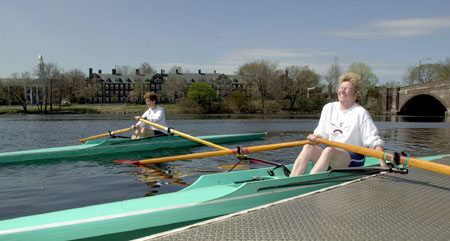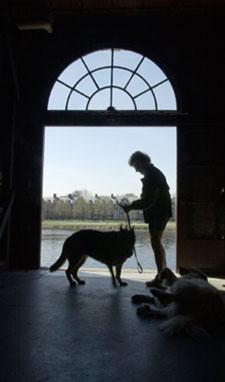She’s reforming school
GSE’s Merseth is back at the helm as director of teacher education, full of plans and enthusiasm

When Katherine Merseth fills out a form that asks for her profession, she always writes “teacher.”
She would be entirely justified in using a title that some consider more prestigious – Senior Lecturer at the Harvard Graduate School of Education. But for Merseth, “teacher” carries enough prestige by itself.
“First and foremost, I consider myself a teacher, and I always have. I started as a high school math teacher, so I’ve really come up through the ranks, and I value that experience. Research is very important because it generates knowledge, but it’s also important to be able to stand up in front of a group of students and engage them, involve them.”
Merseth has been named director of teacher education at the Graduate School of Education (GSE), a position she held from 1983 to 1988 (she was the program’s founding director) and returns to now, filled with new plans and enthusiasm.

“It’s a very exciting homecoming for me,” she said. “I think it’s a very auspicious time for the School of Education – and for anyone interested in the future of public education – to be involved in the education of teachers.”
Jerome T. Murphy, Dean of the GSE, said of Merseth’s appointment: “We’re absolutely thrilled to have Kay leading our efforts in teacher education. I know she’ll be building on the innovations of existing programs – like Mid-Career Math & Science – to develop and implement fresh ideas that will help transform the field.”
The GSE’s Teacher Education Program, in which students simultaneously earn a master of education (Ed.M.) degree and certification from the state of Massachusetts to teach middle and high school, provides an important avenue into the teaching profession as well as having a significant impact on the public education system itself. As director, Merseth plans to stress two main themes that will help the program stay current with developing needs.
First, Merseth believes that teachers should not simply impart knowledge to their students, but develop their ability to both apply and create knowledge themselves. She believes that this ability involves a set of skills that are as relevant to mathematics, science, and technology as they are to history and language study.
As an example of the distinction between simple rote learning and the creative use of knowledge, she compares a child who has memorized his or her multiplication facts and knows that 3 times 8 equals 24 with a child who has a deeper understanding of what multiplication means and can use that knowledge to find the area of a rectangle that measures 8 inches by 3 inches.
“A lot of kids end up believing that knowledge is something that somebody else has created and there’s no way they can create it themselves. I don’t want our graduates or their students to stand for that. Every human being has this wonderful gift to be able to create new understandings, new linkages, new knowledge. I want our graduates to be able to allow students to come to that belief and understand it.”
Merseth’s second main theme is one that is unusual among schools of education and may be somewhat controversial as well. It comes out of her conviction that a teacher’s responsibility is not merely to teach students, but to promote positive change in the schools as a whole.
“It will no longer be sufficient for a teacher to be a terrific classroom teacher in one room with the door closed. We need to develop new teachers who understand how schools operate, how the organization of a school is influenced, who understand the politics of schooling, who understand how to collaborate with colleagues to bring about school reform.”
Merseth realizes that sending young teachers out to battle against the status quo may involve something of a risk, but she believes it is a risk that needs to be taken.
“In years past we would develop extraordinary teachers, but we’d put them in these dysfunctional schools and they’d leave, and in five years we’d lose 50 percent of our teachers because the conditions are so hard and they don’t have the coping skills to deal with them.”
By helping teachers learn the skills that will help them lead organizational reform efforts, Merseth hopes that the program can have a positive influence on the larger school system.
“If we’re going to solve the challenges that face us in public education, we’re going to have to change schools and systems and states. And so, while first and foremost you have to be a terrific teacher of children, I think a very close second is a very skillful understanding of how organizations change, how to be a leader, how to make things better for lots of kids, not just those in one classroom.”
A self-described entrepreneur whose greatest joy is developing new ideas into successful, self-sustaining operations, Merseth has made organizational analysis and strategic planning her own personal area of expertise. “I’ve looked a lot at how we act as leaders and try to move things forward. So it’s a nice opportunity for me to apply what I’ve been preaching,” she said.
The job Merseth currently holds also gives some hint of why the emphasis on school reform is so important to her. For the past two years, she has been director of the GSE’s School Leadership Program, which trains teachers, principals, and school developers who want to provide leadership in school reform. Thomas Hehir, a lecturer on education, will take over the program when Merseth assumes her new role.
Merseth recognizes that neither she nor the GSE can accomplish these goals in isolation. Collaboration will be the order of the day as she moves forward in her new position. For one thing, she seeks more reciprocal relationships with urban public schools, relationships that she believes will be mutually beneficial.
“I’d like there to be a more permeable boundary between the world of theory and the world of practice, permeable in the sense that I want our students to be able to move freely and fluently and know that there is a great deal to be learned out in the K-12 schools, and there’s a great deal to be learned here.”
To that end she is launching the Cambridge-Harvard Summer Academy this summer in collaboration with Cambridge Rindge and Latin High School. Beginning students in the Teacher Education Program will serve as teachers in a five-week program for grades 9 through 12. The Ed.M. candidates will get real-life experience under the mentorship of experienced teachers.
“It’s essentially a laboratory where our students will get a chance to work with kids and be very closely monitored and coached. We’re extremely excited about it,” she said.




